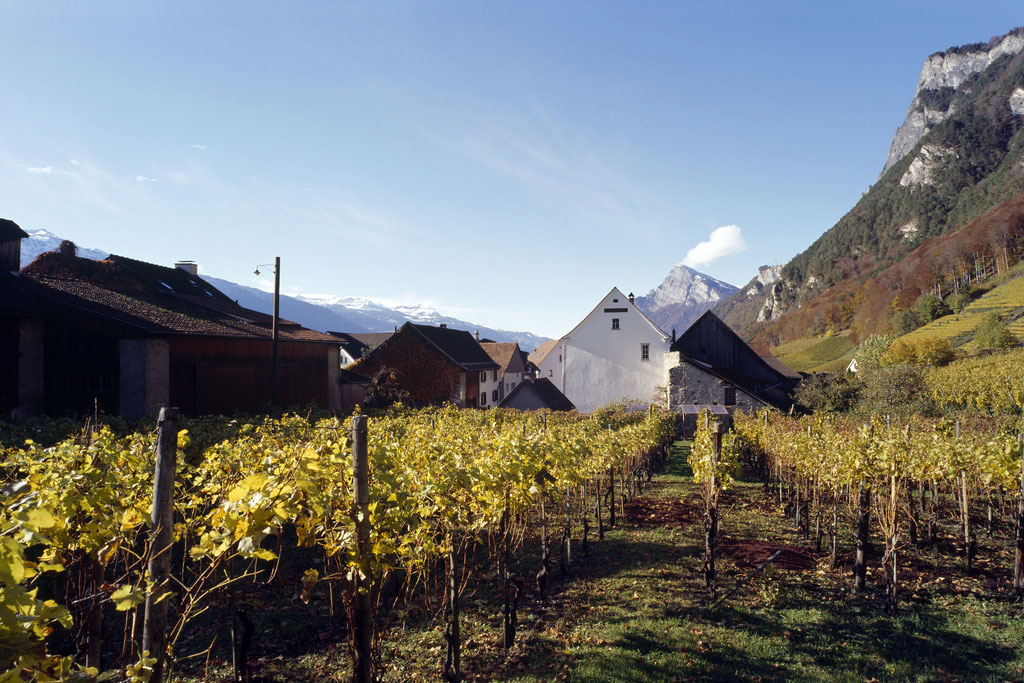Heritage prize adds value to wine

2010 could prove to be a very good year for the wines made in a little known corner of Switzerland.
The eastern village of Fläsch in the Rhine Valley is the winner of this year’s Wakker prize, Switzerland’s top heritage award, which could be a boost to its winemaking.
Think of Swiss food and beverages and you are more likely to come up with chocolate, cheese and Ovaltine. Wine from Switzerland has few friends abroad.
“Swiss wines have neither a good nor a bad reputation abroad. They have no reputation at all. The so-called Swissness has never been a guarantee of quality as is the case with our cheese,” says Stephan Wehrle, a wine expert.
The reason is because they are considered too expensive, poorly marketed, of inferior quality or not produced in quantities worth exporting.
But the wine region centred around Bad Ragaz, which includes Fläsch and Maienfeld – the fictional home of Heidi – does better than most. While it represents just two per cent of all Swiss vineyards, there are 40 varieties of grape spread over 420 hectares along the Rhine Valley.
After wine subsidies were ended in 1993, many Swiss winegrowers opted to produce as much wine as they could. But in the so-called Bündner Herrschaft, local producers opted for quality and restricted the volume of grapes harvested.
“The wine market became totally free at the same time, and Swiss wine drinkers no longer had to consume local vintages if they didn’t want to,” Fläsch wingrower Hansruedi Adank told swissinfo.ch.
Focus on quality
The decision to focus on quality seems to have paid off. Adank reckons about ten per cent of local production heads abroad, whereas the Swiss average is closer to one per cent.
Many foreigners appreciate Bündner wines. For Michael Pillman, a former chef at the Quellenhof hotel in Bad Ragaz, there are a number of reasons for this: the many northern European tourists making stops in the area on their way to Italy, the region’s cooking that highlights local wines, and the fact that the numerous German visitors travelling through the region tend to demand local products.
The Bünder winegrowers reckon they could probably sell all their production abroad while vintners in other regions have trouble marketing their wines.
“Many concentrate on the cheaper end of the market and only produce top-quality wine in small quantities that are sold before they can be exported,” said winegrower Martha Gantenbein.
“We try to focus on making just one wine that can be exported in larger quantities.”
Around one third of her production heads abroad to a variety of markets. Not just in nearby countries, but also to the United States and Russia, most of it ending up in restaurants where it is much more visible than in the retail sector, according to Gantenbein.
For exporters, the challenge is not to make the first sale. “You only know a year later if the customer is going to order again,” she told swissinfo.ch
Exports not favoured
Professional winegrowers like Gantenbein are selling to the premium sector. Many of their Swiss colleagues have the same approach, but don’t see the necessity to export their produce, says Wehrle.
“What they don’t understand is that to be present in the premium market, you have to have international distribution, either via a respected hotel chain or a retailer with worldwide connections,” he explained.
This is why Swiss winemakers have failed to develop an internationally recognized brand. Producers such as Gantenbein have realised this and tend to do their own marketing rather than rely on structures they don’t trust.
Fläsch’s Wakker prize could be another boost to the local winegrowing industry. Adank is convinced this will be the case.
“Fläsch is smaller than the better known Maienfeld. But I think the whole [Bünder] region will benefit,” he said.
Adank points out that the local wine production has close ties with the tourist industry. And he reckons the Wakker prize could become an additional guarantee of quality.
Not that it is absolutely necessary. The most favored grape in the region is the Pinot Noir, and so far wines produced with it have held up favorably against competitors from other countries in international competitions.
Alexander Künzle, swissinfo.ch (adapted from German by Scott Capper)
Fläsch in canton Graubünden was awarded the prestigious Wakker Heritage Prize 2010 for its “innovative local planning”.
The Swiss Heritage Society awards the prize every year to a town or village in recognition of successful urban planning developments.
The village in the Rhine valley in eastern Switzerland was singled out for its “fragmented reorganisation”, which had enabled it to maintain its winegrowing culture in the face of housing pressure.
The Swiss Heritage Society added that Fläsch’s 600 inhabitants had actively pushed for contemporary buildings of good quality, which had successfully enforced the village’s unique character.

In compliance with the JTI standards
More: SWI swissinfo.ch certified by the Journalism Trust Initiative













You can find an overview of ongoing debates with our journalists here . Please join us!
If you want to start a conversation about a topic raised in this article or want to report factual errors, email us at english@swissinfo.ch.